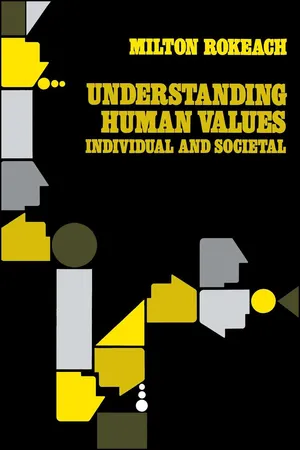Social Sciences
American Values
American values encompass a range of beliefs and principles that are considered fundamental to American society, including individualism, equality, freedom, and democracy. These values have shaped the nation's history, culture, and institutions, influencing everything from politics and economics to social interactions and personal aspirations. While interpretations and applications of these values may vary, they continue to play a significant role in shaping American identity and societal norms.
Written by Perlego with AI-assistance
Related key terms
3 Key excerpts on "American Values"
- eBook - ePub
Political Philosophy
Fact, Fiction, and Vision
- Mario Bunge(Author)
- 2017(Publication Date)
- Routledge(Publisher)
3 Values and Morals: Individual and SocialMost political issues are about social problems, and these in turn involve such values as security, fairness, inclusiveness, equality, and freedom, every one of which can be either expanded or shrunk. Values have recently become all the rage in American politics. Indeed, many Americans have been persuaded that politics has suddenly become a clash between those concerned about values and those who are not. Moreover, the Christian Right claims to have a monopoly on values. Sanctimony is cheaper than virtue. Even the prestigious Science echoed that vulgar opinion about the recency of values. In its February 11, 2005 editorial the publication claimed that “science and its products are intersecting more frequently [than in the past] with certain human beliefs and values.” And it added that “certain recent experiences [presumably President Bush’s reelection two months earlier] suggest that the values dimension is here to stay.”In fact all purposive human actions have always had a “values dimension.” Indeed, every time we do something deliberately—whether fishing or trading, conjecturing or checking a hypothesis—we make more or less explicit value judgments. One takes action A because one values either A in itself or an expected consequence of A . In particular, scientific research has always been pulled by secular values, such as knowledge and peer recognition. And politics may be regarded as the social action that endeavors to either implement or block value systems.The question is not whether we hold values but whether we can justify and debate rationally about them It is here where scholars differ. Max Weber (1988a) warned his colleagues against making value judgments, for he believed them to be incurably subjective. By contrast, Gunnar Myrdal (1969) enjoined social scientists to start by declaring their values. The reason is that, whereas the physical universe is value-free, the social world is value-laden, and so is any suggestion or command to conserve or reform it. Hence the interest of political scientists and philosophers in identifying and defining values in both political action and political discourse—as, for instance, in regarding the competency or fairness of an administrator. This is also why we get embroiled in rational (and sometimes irrational) debates about values and their ranking in all walks of life. Unlike tastes, which are largely subjective, some values, such as livability and peace, are objective, and therefore deserve being discussed rationally. - eBook - ePub
- Milton Rokeach(Author)
- 2008(Publication Date)
- Free Press(Publisher)
without repudiation of the values which legitimate the conflict-resolving process or mechanisms , the more highly generalized values will come more and more to be regarded as axiomatic or unchallengeable. Although the specific social implications of the general value principle will be changed through successive occasions, nevertheless, all parties come to have a stake in maintaining the complex value referent as a resource for the future.VALUES AND SOCIAL CHANGE IN AMERICAN SOCIETY With these illustrative materials in mind, let us now turn to a more systematic review of value patterns in the United States. The Mid-century InventoryIn repeated earlier analyses (1951, 1960, 1970) we drew upon a large and diverse body of data from historical, economic, political, and sociological studies to describe some 15 major themes of value-belief orientations that have long been salient in American society. The list is as follows: - eBook - ePub
- Michael R. Solomon, Tina M. Lowrey(Authors)
- 2017(Publication Date)
- Routledge(Publisher)
11 SOCIAL VALUES IN CONSUMER PSYCHOLOGY: KEY DETERMINANTS OF HUMAN BEHAVIOR Wang Suk Suh and Lynn R. Kahle UNIVERSITY OF OREGON, EUGENE, OR, USA Social science researchers in a variety of disciplines, such as psychology, sociology, anthropology, information science, and consumer behavior, have continuously investigated social values and emphasized their importance (Cheng & Fleischmann, 2010). Therefore, values tend to be defined in different ways based on the context. However, the previous literature across the disciplines collectively argues that a social value in this sense is a direct motivation that determines people’s actual behaviors (e.g., Kahle, 1983; Rokeach, 1973). In psychology, for example, Rokeach defines a human value as “an enduring belief that a specific mode of conduct or end-state of existence is personally or socially preferable to an opposite or converse mode of conduct or end-state of existence” (p. 5). This definition has a thread of connection with the illustration of values in sociology research that “… values are not the same as ideals, norms, desired objects, or espoused beliefs about the ‘good’, but are, instead, operating criteria for action …” (Hutcheon, 1972, p. 184). Rokeach argues that the concept of social values is one of the most important constructs in social science, because it leads people to determine their behaviors, explaining that values play critical roles as “determinants of virtually all kinds of behavior that could be called social behavior or social action, attitudes and ideology, evaluations, moral judgments and justifications of self to others, and attempts to influence others” (p. 5). Although Maslow (1954) interchangeably used the term of values with people’s needs, on the other hand, he also insists that people behave based on their values, and the values depend on different situations they may face (i.e., physiological, safety, love/belonging, esteem, and self-actualization)
Learn about this page
Index pages curate the most relevant extracts from our library of academic textbooks. They’ve been created using an in-house natural language model (NLM), each adding context and meaning to key research topics.


